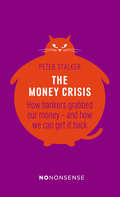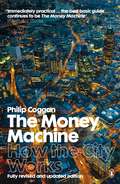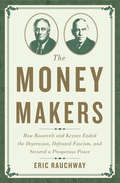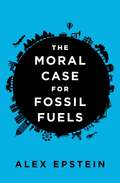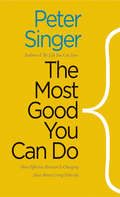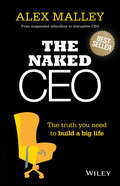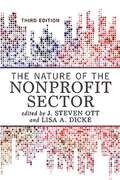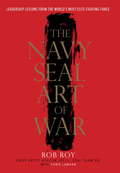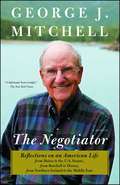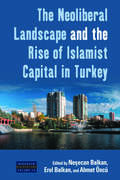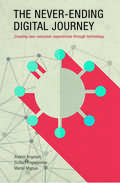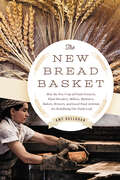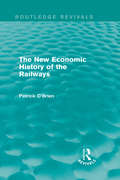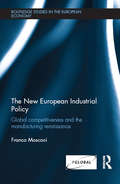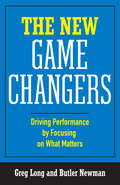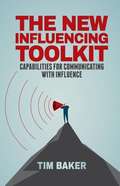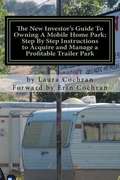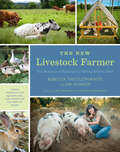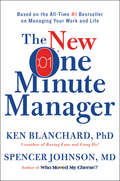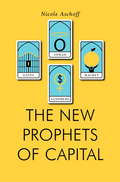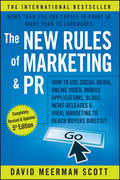- Table View
- List View
The Money Crisis: How Bankers Grabbed Our Money—and How We Can Get It Back (No-Nonsense Guides)
by Peter StalkerBankers and speculators build castles in the air but when they come crashing down ordinary people have to pick up the tab. How have we made such a mess of our money system?
The Money Machine: How the City Works
by Philip CogganWhat happens in the City has never affected us moreIn this excellent guide, now fully revised and updated, leading financial journalist Philip Coggan cuts through the headlines, the scandals and the jargon to explain the nuts and bolts of the financial system.What causes the pound to rise or interest rates to fall? Which are the institutions that really matter? Why is it we need the Money Machine - and what happens when it crashes? Coggan provides clear and concise answers and shows why we should all be more familiar with a system we so intimately depend upon.
The Money Makers: How Roosevelt and Keynes Ended the Depression, Defeated Fascism, and Secured a Prosperous Peace
by Eric RauchwayShortly after assuming office in early 1933, Franklin D. Roosevelt made the bold decision to take the United States off the gold standard. This was only the first act in his quest to use monetary policy as a political tool. In The Money Makers, the distinguished historian Eric Rauchway shows how FDR and his brilliant team of advisers--John Maynard Keynes, Harry Dexter White, and Cordell Hull--paved the way for economic recovery. By responding decisively to the Great Depression at home, they warded off indigenous fascist movements and ensured an Allied victory in World War II, laying the foundation for decades of global peace and prosperity.Capturing not only the contentious debates among these headstrong figures but also the spirit of innovation that united them, Rauchway argues that we have forgotten their accomplishments. One result is that our modern preference for monetary stability over economic growth has led to stagnation and rising inequality. By uncovering the origins of midcentury economic success, Rauchway shows how we can recapture prosperity for our own age.
The Moral Case for Fossil Fuels
by Alex EpsteinCould everything we know about fossil fuels be wrong?For decades, environmentalists have told us that using fossil fuels is a self-destructive addiction that will destroy our planet. <P><P>Yet at the same time, by every measure of human well-being, from life expectancy to clean water to climate safety, life has been getting better and better.How can this be?The explanation, energy expert Alex Epstein argues in The Moral Case for Fossil Fuels, is that we usually hear only one side of the story. We're taught to think only of the negatives of fossil fuels, their risks and side effects, but not their positives--their unique ability to provide cheap, reliable energy for a world of seven billion people. And the moral significance of cheap, reliable energy, Epstein argues, is woefully underrated. Energy is our ability to improve every single aspect of life, whether economic or environmental.If we look at the big picture of fossil fuels compared with the alternatives, the overall impact of using fossil fuels is to make the world a far better place. <P>We are morally obligated to use more fossil fuels for the sake of our economy and our environment.Drawing on original insights and cutting-edge research, Epstein argues that most of what we hear about fossil fuels is a myth.<P> For instance . . .Myth: Fossil fuels are dirty.Truth: The environmental benefits of using fossil fuels far outweigh the risks. Fossil fuels don't take a naturally clean environment and make it dirty; they take a naturally dirty environment and make it clean. They don't take a naturally safe climate and make it dangerous; they take a naturally dangerous climate and make it ever safer.Myth: Fossil fuels are unsustainable, so we should strive to use "renewable" solar and wind.Truth: The sun and wind are intermittent, unreliable fuels that always need backup from a reliable source of energy--usually fossil fuels. There are huge amounts of fossil fuels left, and we have plenty of time to find something cheaper.Myth: Fossil fuels are hurting the developing world.Truth: Fossil fuels are the key to improving the quality of life for billions of people in the developing world. If we withhold them, access to clean water plummets, critical medical machines like incubators become impossible to operate, and life expectancy drops significantly. Calls to "get off fossil fuels" are calls to degrade the lives of innocent people who merely want the same opportunities we enjoy in the West.Taking everything into account, including the facts about climate change, Epstein argues that "fossil fuels are easy to misunderstand and demonize, but they are absolutely good to use. And they absolutely need to be championed. . . . <P>Mankind's use of fossil fuels is supremely virtuous--because human life is the standard of value and because using fossil fuels transforms our environment to make it wonderful for human life."
The Most Dangerous Trade
by Richard TeitelbaumHow short sellers profit from disasters that afflict individuals, markets, and nations The Most Dangerous Trade serves up tales from the dark side of the world marketplace to reveal how traders profit from the failure and, often, the financial ruin of others. In this book Richard Teitelbaum profiles more than a dozen short sellers to reveal how they employ the tactics, strategies, and various styles to zero in on their target, get the needed financing, and see their investment through to its ultimate conclusion. The short sellers profiled will include stories of both their successful investments as well as their disastrous ventures. The book will examine the different styles, strategies, and tactics utilized, looking at how each short seller researches his or her targets, obtains financing, puts on a trade, and sees the investment through to fruition--or failure. With the appeal of a well-written adventure novel, The Most Dangerous Trade reveals how these investors seek publicity to help drive down a stock and shows the often bitter and controversial battles that ensue. Includes profiles of well-know short sellers such as Jim Chanos, Steve Eisman, Manuel Ascencio, Doug Kass, and many more Discover how short sellers make the "puts" that make them billions Uncover the short selling controversies that make headlines Written by award-winning journalist Richard Teitelbaum Discover what motivates investors who wager against the stock market and how they often profit from the misery of others.
The Most Good You Can Do: How Effective Altruism Is Changing Ideas About Living Ethically (Castle Lectures Ser.)
by Peter SingerAn argument for putting sentiment aside and maximizing the practical impact of our donated dollars: &“Powerful, provocative&” (Nicholas Kristof, The New York Times). Peter Singer&’s books and ideas have been disturbing our complacency ever since the appearance of Animal Liberation. Now he directs our attention to a challenging new movement in which his own ideas have played a crucial role: effective altruism. Effective altruism is built upon the simple but profoundly unsettling idea that living a fully ethical life involves doing the &“most good you can do.&” Such a life requires a rigorously unsentimental view of charitable giving: to be a worthy recipient of our support, an organization must be able to demonstrate that it will do more good with our money or our time than other options open to us. Singer introduces us to an array of remarkable people who are restructuring their lives in accordance with these ideas, and shows how, paradoxically, living altruistically often leads to greater personal fulfillment than living for oneself. Doing the Most Good develops the challenges Singer has made, in the New York Times and Washington Post, to those who donate to the arts, and to charities focused on helping our fellow citizens, rather than those for whom we can do the most good. Effective altruists are extending our knowledge of the possibilities of living less selfishly, and of allowing reason, rather than emotion, to determine how we live. Doing the Most Good offers new hope for our ability to tackle the world&’s most pressing problems.
The Naked CEO
by Alex MalleyThe Naked CEO's guide to achieving your dream, starting nowFrom suspended schoolboy to disruptive CEO, Alex Malley, The Naked CEO, has led a life rich in successes and mistakes. Through it all he has learned a lot about what it takes to successfully build not only a big career, but also a big life.Gain insights from a successful CEO who's lived a big life. Be inspired by his unabashed real-life stories. Learn how to dream big and have the courage to pursue your passions and be willing to fail in that quest. Take the practical tips and apply them to your own career.Whether you're a student, jobseeker, professional, new to the workforce or just stuck in a rut, this book is your guide through the hurdles of the career journey to a big life. As a father of seven, Alex knows that this is the perfect book for parents or mentors looking to inspire the next generation.Career-readiness is a skill that people need. It can be learned the hard way, after years on the job and many potentially serious missteps, or it can be learned ahead of time by listening to those who have been there. The Naked CEO helps graduates, jobseekers, and professionals learn the lessons and limit their mistakes.Learn how to:Become a leaderSuccessfully stand out and get noticedHarness the power of being yourselfNetwork and create a profileEstablish rapport with colleagues and turn around an under-performing teamGet organised, spot opportunities, and learn how to say noSet priorities, build confidence, learn how to delegate, and moreThe Naked CEO is the truth you need to build a big life.
The National Geographic Society (B)
by David A. GarvinThis case was written as an update to the case "The National Geographic Society," HBS No. 311-002, published in 2011. The (B) case describes the 2015 creation of National Geographic Partners, a for-profit joint venture between the National Geographic Society and 21st Century Fox. It describes the basic structure and terms of the deal as well as diverse reactions to it.
The Nature Of The Nonprofit Sector (Third Edition)
by J. Steven Ott Lisa A. Dicke<P>The Nature of the Nonprofit Sector is a collection of insightful and influential classic and recent readings on the existence, forms and functions of the nonprofit sector? <P>The sector that sits between the market and government. The book encompasses everything from Andrew Carnegie's turn-of-the-century philosophy of philanthropy to the most recent writings by current scholars and practitioners from a wide variety of perspectives and disciplines. Each part in the book opens with a framing essay by the editors that provides an overview of the central themes and issues, as well as the sometimes competing points of view. <P>The third edition has been thoroughly revised and updated to feature new essays that analyze the nonprofit sector's place in our economy and its relationship to our government, and new readings on the economic, community, and civil society theories of the nonprofit sector. The Nature of the Nonprofit Sector is thorough, topical, and above all, accessible to students, making it the ideal text for graduate and upper-division undergraduate nonprofit organizations and management survey courses.
The Navy SEAL Art of War
by Rob Roy Chris LawsonIn a groundbreaking, narrative-driven book for businesses, managers (and those who aspire to the managerial ranks), and entrepreneurs, a veteran Navy SEAL Chief Petty Officer shows how the skills that enable SEAL teams to achieve the impossible in the battlefield can help business executives and career-minded individuals make better decisions and get the best out of their teams. Anyone can make good decisions when everything is in their favor. But in life, as in war, it's in chaotic, challenging times that genuine leaders distinguish themselves. As a Navy SEAL Chief Petty Officer, Rob Roy learned this lesson over twenty-five years of combat, in which the difference between life and death was his team's ability to decode complex environments, take decisive action, and seize opportunities when they presented themselves. In The Navy SEAL Art of War, Roy decodes the leadership lessons of the battlefield for today's business leaders and individuals: how to make good decisions under pressure, how to utilize and leverage the strengths of others while minimizing the weaknesses of the individual or team, and how to act instead of react, anticipating events despite having minimal information and effectively communicating tasks and priorities. Illustrated with countless stories from the front lines, and featuring unprecedented exercises and drills from the SEALs' training program, The Navy SEAL Art of War is destined to take its place aside It's Your Ship as a bestselling business classic.
The Navy SEAL Art of War: Leadership Lessons from the World's Most Elite Fighting Force
by Rob Roy Chris LawsonIn a groundbreaking, narrative-driven book for businesses, managers (and those who aspire to the managerial ranks), and entrepreneurs, a veteran Navy SEAL Chief Petty Officer shows how the skills that enable SEAL teams to achieve the impossible in the battlefield can help business executives and career-minded individuals make better decisions and get the best out of their teams. Anyone can make good decisions when everything is in their favor. But in life, as in war, it’s in chaotic, challenging times that genuine leaders distinguish themselves. As a Navy SEAL Chief Petty Officer, Rob Roy learned this lesson over twenty-five years of combat, in which the difference between life and death was his team’s ability to decode complex environments, take decisive action, and seize opportunities when they presented themselves. In The Navy SEAL Art of War, Roy decodes the leadership lessons of the battlefield for today’s business leaders and individuals: how to make good decisions under pressure, how to utilize and leverage the strengths of others while minimizing the weaknesses of the individual or team, and how to act instead of react, anticipating events despite having minimal information and effectively communicating tasks and priorities. Illustrated with countless stories from the front lines, and featuring unprecedented exercises and drills from the SEALs’ training program, The Navy SEAL Art of War is destined to take its place aside It’s Your Ship as a bestselling business classic.
The Negotiator: A Memoir
by George J. MitchellCompelling, poignant, enlightening stories from former Senate Majority Leader George Mitchell about growing up in Maine, his years in the Senate, working to bring peace to Northern Ireland and the Middle East, and what he’s learned about the art of negotiation during every stage of his life.It’s a classic story of the American Dream. George Mitchell grew up in a working class family in Maine, experiencing firsthand the demoralizing effects of unemployment when his father was laid off from a lifelong job. But education was always a household priority, and Mitchell embraced every opportunity that came his way, eventually becoming the ranking Democrat in the Senate during the administrations of George H.W. Bush and Bill Clinton. Told with wit, frankness, and a style all his own, Senator Mitchell’s memoir reveals many insights into the art of negotiation. Mitchell looks back at his adventures in law and politics—including instrumental work on clean air and water legislation, the Iran-Contra hearings, and healthcare reform—as well as life after the Senate, from leading the successful Northern Ireland peace process, to serving as chairman of The Walt Disney Company, to heading investigations into the use of steroids in baseball and unethical activity surrounding the Olympic Games. Through it all, Senator Mitchell’s incredible stories—some hilarious, others tragic, all revealing—offer invaluable insights into critical moments in the last half-century of business, law, and politics, both domestic and international.
The Neoliberal Landscape and the Rise of Islamist Capital in Turkey
by NeÅecan Balkan Erol Balkan Ahmet ÖncüIslamist capital accumulation has split the Turkish bourgeoisie and polarized Turkish society into secular and religious social groupings, giving rise to conflicts between the state and political Islam. By providing a long-term historical perspective on Turkey's economy and its relationship to Islamism, this volume explores how Islamism as a political ideology has been utilized by the conservative bourgeoisie in Turkey, and elsewhere, to establish hegemony over labor. The contributors analyze the relationship between neoliberalism and the political fortunes of the Islamist Justice and Development Party (AKP), and examine the similarities and differences amongst new factions in the secular and Islamic middle class that have benefited economically, socially, and culturally during the AKP's reign. The articles also investigate the impact of the Gülen Movement and the role of the media in shaping the contours of intra-class struggle within contemporary Turkish political and social life.
The Never-Ending Digital Journey: Creating new consumer experiences through technology
by Andrés Angelani Guibert Englebienne Martín MigoyaThe Never-Ending Digital Journey provides readers with the concepts and steps needed to create successful user experiences. The authors look ahead and explore digital scenarios of the future. They probe how technology is changing the way users interact with brands, and they address today’s digital challenges with new ways of surprising consumers, integrating design and engineering. <P><P> The authors leverage knowledge gleaned from working with renowned global companies to describe the recipe needed to build a Digital Journey. With a strong focus on Agile Pods, they dive into technolo- gies, processes, team building, motivation, and met- rics that enable businesses to construct and nurture the dynamic ecosystems necessary in this digital era to foster success.
The New Bread Basket: How the New Crop of Grain Growers, Plant Breeders, Millers, Maltsters, Bakers, Brewers, and Local Food Activists Are Redefining Our Daily Loaf
by Amy HalloranFor more than 10,000 years, grains have been the staples of Western civilization. The stored energy of grain allowed our ancestors to shift from nomadic hunting and gathering and build settled communities—even great cities. Though most bread now comes from factory bakeries, the symbolism of wheat and bread—amber waves of grain, the staff of life—still carries great meaning.Today, bread and beer are once again building community as a new band of farmers, bakers, millers, and maltsters work to reinvent local grain systems. The New Bread Basket tells their stories and reveals the village that stands behind every loaf and every pint.While eating locally grown crops like heirloom tomatoes has become almost a cliché, grains are late in arriving to local tables, because growing them requires a lot of land and equipment. Milling, malting, and marketing take both tools and cooperation. The New Bread Basket reveals the bones of that cooperation, profiling the seed breeders, agronomists, and grassroots food activists who are collaborating with farmers, millers, bakers, and other local producers. Take Andrea and Christian Stanley, a couple who taught themselves the craft of malting and opened the first malthouse in New England in one hundred years. Outside Ithaca, New York, bread from a farmer-miller-baker partnership has become an emblem in the battle against shale gas fracking. And in the Pacific Northwest, people are shifting grain markets from commodity exports to regional feed, food, and alcohol production. Such pioneering grain projects give consumers an alternative to industrial bread and beer, and return their production to a scale that respects people, local communities, and the health of the environment.Many Americans today avoid gluten and carbohydrates. Yet, our shared history with grains—from the village baker to Wonder Bread—suggests that modern changes in farming and processing could be the real reason that grains have become suspect in popular nutrition. The people profiled in The New Bread Basket are returning to traditional methods like long sourdough fermentations that might address the dietary ills attributed to wheat. Their work and lives make our foundational crops visible, and vital, again.
The New Economic History of the Railways (Routledge Revivals)
by Patrick O'BrienThe book, first published in 1977, contrasts new and older approaches to the history of transport and outlines a critical exposition of the methods used to quantify the contribution of railways to economic growth by means of counterfactual speculation and the measurement of social savings. The author also outlines and appraises an alternative measure of the impact of railways, namely the social rate of return on capital invested in railways. The final chapters are concerned with the effects on growth generated by the construction and diffusion of railways through expenditure on labour, capital goods and industrial inputs and through their effects on the integration of markets, and patterns of location.
The New European Industrial Policy: Global Competitiveness and the Manufacturing Renaissance (Routledge Studies in the European Economy)
by Franco MosconiThe years since the global financial crisis have seen something of a renaissance in the manufacturing industry. The United States has launched its Advanced Manufacturing Partnership, and China owes much of its spectacular economic boom in the last decades to its being the 'world's factory'. Is there room for the EU in this landscape? This timely new book explores Europe’s role in this evolving environment. It argues that on the one hand, in terms of sheer numbers, the role of the manufacturing industry in the EU is on a par with other major global economies. However, the book also states that Europe falls short of its global competitors (the USA in particular) in terms of its involvement in the most innovative manufacturing sectors. The volume therefore argues that this creates the opportunity for a new European industrial policy. Exploring the development of current EU policy, the book puts forward suggestions as to how the EU can improve in terms of the competitiveness of its technology policy. Placing the EU’s position in the context of the industrial structures of the USA, Japan and the BRICs, the book blends theoretical models and practical examples in order to offer a the state of the art look at the current and future direction of Europe’s industrial policy. This book will be of relevance to all those with an interest in European economics, industrial economics, public policy, European politics and European studies.
The New Game Changers: Driving Performance by Focusing on What Matters
by Greg Long Butler NewmanAs the business environment grows ever more complex and new competitors enter the market, the demands on leadership change. Conventional approaches won't cut it any longer. The New Game Changers tells the story of Aimee Martin, who rejoins her former company to turn around slumping sales. The sales training initiative that was implemented while she was away came highly recommended, but it was not well received by the frontline staff. And now the new head of marketing is proposing yet another initiative--a slick digital sales campaign.The trouble is, Aimee realizes, these approaches focus on the wrong things.Aimee's realization launches her on a quest that leads to her discovery of four essential strategies that help her focus on the outcomes that make a real impact and transform her leadership. The result: a winning team and business success!The New Game Changers is an easy-to-understand guide that teaches you a new way of thinking that will help you take your team and your organization to the next level.Greg Long and Butler Newman have worked together across multiple aspects of organizational improvement for over twenty-five years. They have collaborated many times to meet the specific needs of their clients and have extended that collaboration to produce this book, The New Game Changers: Driving Performance by Focusing on What Matters."Using top performers as a model is a powerful and effective way to improve performance. The New Game Changers' focus on top performers' outcomes is a potent methodology for optimizing individual and organizational success."--William Seidman, PhD, CEO, Cerebyte, Inc., and coauthor of The Star Factor"A must-read for any business leader, The New Game Changers is engaging and delightful in illustrating how to best leverage frontline performers to improve a company's bottom-line performance."--Ken Rebeck, President, KRA Associates, LLC
The New Influencing Toolkit
by Tim BakerWithout influence, managers are ineffective. In today's workplace, managers need to influence up, down and increasingly, sideways as organizations become less hierarchical. This book is expertly designed to diagnose and develop managerial influence, focusing on four key strategies: investigating, calculating, motivating and collaborating.
The New Investor's Guide to Owning a Mobile Home Park: Why Mobile Home Park Ownership is the Best Investment in this Economy and Step by Step Instructions to Acquire and Manage a Profitable Park
by Laura Cochran Erin CochranThe New Investor's Guide To Owning A Mobile Home Park: Why mobile home park ownership is the best investment in this economy and step by step instructions how to acquire and manage a profitable park Multi-park owner and manager of her own mobile home parks, Laura Cochran, believes that owning a mobile home park is the best investment and attainable for anyone who wants to add a mobile home park investment to his or her portfolio. "Purchasing a mobile home park is in my opinion, and based on my own twenty-two years of real estate and mobile home park investing, the best alternative investment for the serious investor. I think every investor should own a mobile home park, and here is why: -Low to zero vacancy rate -Steady monthly income -Predictable monthly cash flow -Good return on investment -Investor has control over cash flow and vacancy rate -Additional opportunities to increase cash flow through rent raises and eliminating utility bills via pass-through billing -Mobile home parks hold their market value and appreciate in value -There is always a demand for affordable housing found in parks -You retain your initial nest egg that you purchased the park with - your investment dollars are in tact
The New Livestock Farmer: The Business of Raising and Selling Ethical Meat
by Rebecca Thistlethwaite Jim DunlopIncludes information on cattle, pigs, poultry, sheep, and goats, and exotics like bison, rabbits, elk, and deer and offers a clear, thorough, well-organized guide to a subject that will become increasingly important as the market demand for pasture-raised meat grows stronger.How can anyone from a backyard hobbyist to a large-scale rancher go about raising and selling ethically produced meats directly to consumers, restaurants, and butcher shops? With the rising consumer interest in grass-fed, pasture-raised, and antibiotic-free meats, how can farmers most effectively tap into those markets and become more profitable? The regulations and logistics can be daunting enough to turn away most would-be livestock farmers, and finding and keeping their customers challenges the rest.Farmer, consultant, and author Rebecca Thistlethwaite (Farms with a Future) and her husband and coauthor, Jim Dunlop, both have extensive experience raising a variety of pastured livestock in California and now on their homestead farm in Oregon. The New Livestock Farmer provides pasture-based production essentials for a wide range of animals, from common farm animals (cattle, poultry, pigs, sheep, and goats) to more exotic species (bison, rabbits, elk, and deer).Each species chapter discusses the unique requirements of that animal, then delves into the steps it takes to prepare and get them to market. Profiles of more than fifteen meat producers highlight some of the creative ways these innovative farmers are raising animals and direct-marketing superior-quality meats.In addition, the book contains information on a variety of vital topics:• Governmental regulations and how they differ from state to state;• Slaughtering and butchering logistics, including on-farm and mobile processing options and sample cutting sheets;• Packaging, labeling, and cold-storage considerations;• Principled marketing practices; and• Financial management, pricing, and other business essentials.This book is must reading for anyone who is serious about raising meat animals ethically, outside of the current consolidated, unsustainable CAFO (Concentrated Animal Feeding Operations) system.&“[This] is what my father Wendell Berry would call the best of books because it is a tool. It fills a cultural need, and will give beginning farmers just the information they need, just the way they need it.&”—Mary Berry, executive director, The Berry Center&“Great practical advice on choosing the species to raise, humane treatment, and marketing. Informative chapters on processing, regulations, and starting a business.&”—Temple Grandin, author of Humane Livestock Handling and Improving Animal Welfare: A Practical Approach
The New One Minute Manager (One Minute Manager Ser.)
by Spencer Johnson Ken BlanchardThe New One Minute Manager offers a way for you to succeed sooner with less stress in changing times--both at work and at home.Based on the original book The One Minute Manager that helped millions of people around the world in organizations large and small, this new version of the classic story deals with a new world.The book will help you find meaning in your work and inspire you to discover new ways to help your organization adapt and prosper.The New One Minute Manager is a concise, easily read story that reveals three very practical secrets: One Minute Goals, One Minute Praisings, and One Minute Re-Directs, the new third secret.The story is based on studies in the behavioral sciences and medicine that support why these apparently simple methods work so well with so many people.And by the book's end, you will know how to apply what you discover to your own situation and enjoy the benefits.ective manager is more relevant and useful than ever.
The New Prophets of Capital
by Nicole AschoffA deft and caustic takedown of the new prophets of profit, from Bill Gates to Oprah As severe environmental degradation, breathtaking inequality, and increasing alienation push capitalism against its own contradictions, mythmaking has become as central to sustaining our economy as profitmaking. Enter the new prophets of capital: Sheryl Sandberg touting the capitalist work ethic as the antidote to gender inequality; John Mackey promising that free markets will heal the planet; Oprah Winfrey urging us to find solutions to poverty and alienation within ourselves; and Bill and Melinda Gates offering the generosity of the 1 percent as the answer to a persistent, systemic inequality. The new prophets of capital buttress an exploitative system, even as the cracks grow more visible.From the Trade Paperback edition.eir way out of poverty; how corporate philanthropy, as espoused by the Bill and Melinda Gates Foundation, promotes the idea that political change happens from above; how Sheryl Sandberg's plea for women to "lean in" supposes that gender inequality can be solved, if women simply allow themselves to be more burdened with more responsibilities and work; and how philosophies of conscious capitalism, like the one promoted by Whole Foods CEO John Mackey, distracts from poor working conditions and low pay.
The New Rules of Marketing and PR
by David Meerman ScottThe most updated edition yet of the benchmark guide to marketing and PR, with the latest social media, marketing, and sales trends, tools, and real-world examples of success This is the fifth edition of the pioneering guide to the future of marketing. The New Rules of Marketing & PR is an international bestseller with more than 350,000 copies sold in over twenty-five languages. It offers a step-by-step action plan for harnessing the power of modern marketing and PR to directly communicate with buyers, raise visibility, and increase sales. This practical guide is written for marketing professionals, PR professionals, and entrepreneurs who want to grow their businesses and create success. Learn how companies, nonprofits, and organizations of all sizes can leverage web-based content to get timely, relevant information to eager, responsive buyers for a fraction of the cost of big-budget campaigns. This fifth edition--the most extensively revised edition yet--includes: Dozens of compelling case studies with revisions Real-world examples of content marketing and inbound marketing strategies and tactics A fresh introduction A new chapter on sales and service Coverage of the latest social media platforms, including Periscope, Meerkat, and Snapchat The New Rules of Marketing & PR is an unparalleled resource for entrepreneurs, business owners, nonprofit managers, and all of those working in marketing or publicity departments. This practical guide shows how to devise successful marketing and PR strategies to grow any business.David Meerman Scott is a marketing strategist, bestselling author of ten books--including three international bestsellers--advisor to emerging companies such as HubSpot, and a professional speaker on marketing, leadership, and social media. Prior to starting his own business, he was marketing VP for two publicly traded US companies and was Asia marketing director for Knight-Ridder, at the time one of the world's largest information companies.
The New Social Division: Making and Unmaking Precariousness (Palgrave Studies in European Political Sociology)
by Donatella Della Porta Tiina Silvasti Sakari Hänninen Martti SiisiäinenThis volume addresses issues of precariousness in a broad, interdisciplinary perspective, looking at socio-economic transformations as well as the identity formation and political organizing of precarious people. The collection bridges empirical research with social theory to problematize and analyse the precariat.
